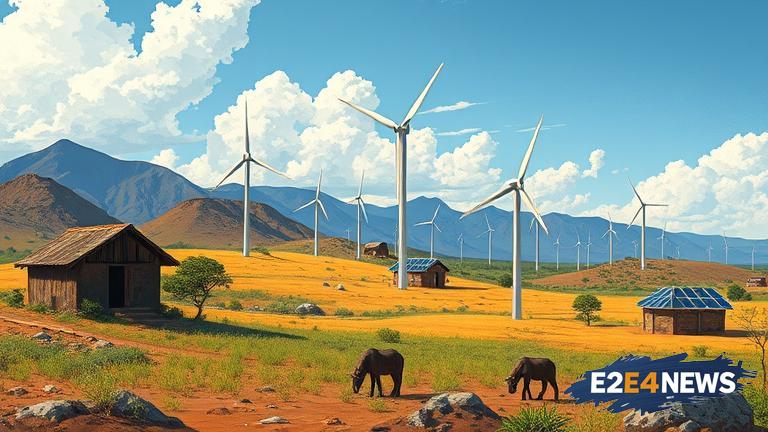The African continent is witnessing a significant shift towards renewable energy, driven by the need to address the pressing issues of energy access, energy security, and climate change. With a growing population and increasing economic activities, the demand for energy in Africa is on the rise. However, the continent’s reliance on fossil fuels has resulted in significant environmental and health impacts. In response, many African countries are now exploring alternative energy sources, such as solar, wind, and hydro power. The use of renewable energy is not only reducing the continent’s carbon footprint but also creating new economic opportunities and jobs. For instance, South Africa has set ambitious targets to increase its renewable energy capacity, with a focus on solar and wind power. Similarly, Kenya has made significant strides in harnessing geothermal energy, with the Olkaria Geothermal Complex being one of the largest in the world. Other countries, such as Egypt and Morocco, are also investing heavily in renewable energy, with a focus on solar and wind power. The African Union has also launched the Africa Renewable Energy Initiative, which aims to achieve at least 300 GW of renewable energy capacity by 2030. The initiative has received significant support from international organizations and donors, who recognize the importance of renewable energy in driving sustainable development in Africa. Despite the progress made, there are still significant challenges to be addressed, including the lack of infrastructure, limited access to financing, and the need for policy and regulatory frameworks that support the development of renewable energy. However, with the growing momentum behind the renewable energy revolution, it is likely that Africa will play an increasingly important role in the global transition to a low-carbon economy. The benefits of renewable energy are numerous, including reduced greenhouse gas emissions, improved air quality, and enhanced energy security. Moreover, renewable energy can also contribute to economic development, by creating jobs and stimulating local economies. In addition, the use of renewable energy can also help to reduce poverty and improve healthcare outcomes, by providing access to reliable and affordable energy. The African continent has vast renewable energy resources, including solar, wind, hydro, and geothermal energy. However, the development of these resources requires significant investment, as well as the development of infrastructure and policy frameworks that support the growth of the renewable energy sector. The private sector is also playing an increasingly important role in the development of renewable energy in Africa, with many companies investing in renewable energy projects across the continent. International organizations, such as the International Renewable Energy Agency (IRENA), are also providing support and guidance to African countries, as they seek to develop their renewable energy sectors. The development of renewable energy in Africa is also being driven by the need to address the pressing issue of energy access, with many communities across the continent lacking access to reliable and affordable energy. The use of renewable energy can help to address this issue, by providing energy access to off-grid communities and reducing the reliance on fossil fuels. In conclusion, the renewable energy revolution in Africa is gaining momentum, driven by the need to address the pressing issues of energy access, energy security, and climate change. With the growing momentum behind the development of renewable energy, it is likely that Africa will play an increasingly important role in the global transition to a low-carbon economy.
